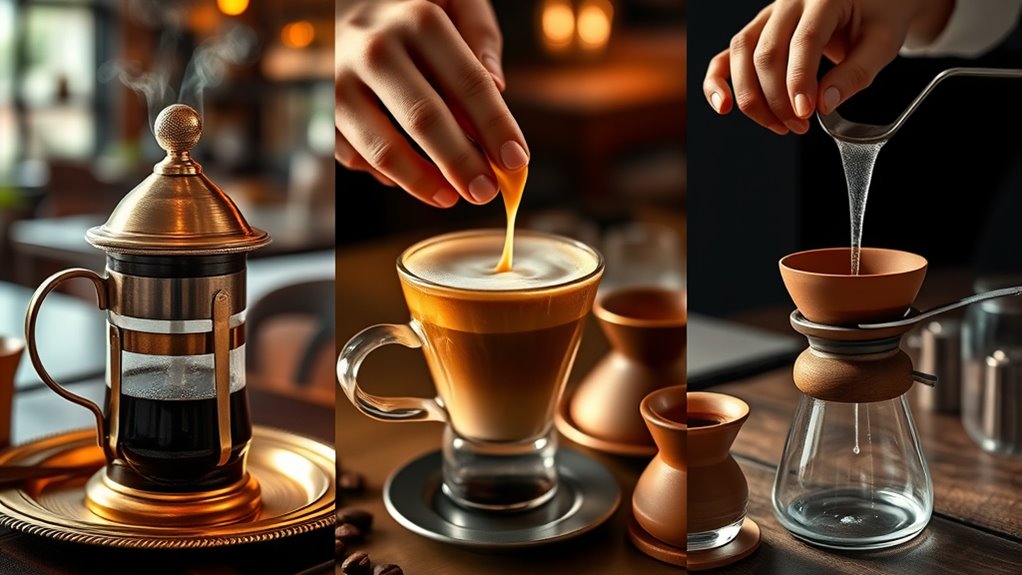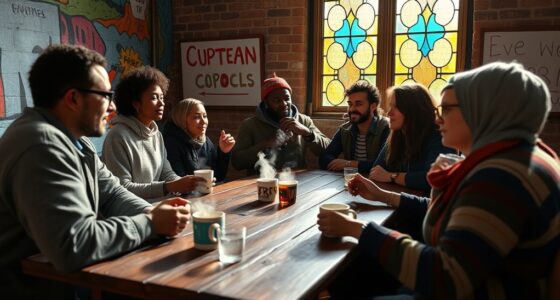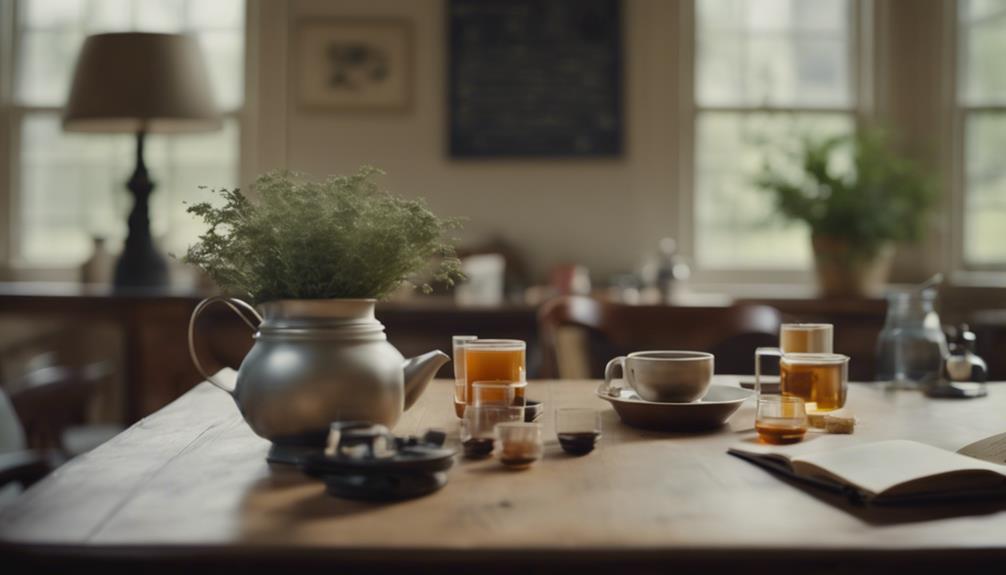Around the world, coffee rituals go beyond just brewing—they reflect cultural values, history, and community. In Ethiopia, the Buna ceremony fosters connection and storytelling, while Turkish coffee with fortune-telling emphasizes respect and spirituality. Southeast Asian customs highlight mindful sharing with ingredients like sweetened condensed milk, and Japanese siphon brewing showcases precision and artistry. Latin American traditions incorporate spices and hospitality, making coffee a powerful symbol of social bonds. To discover more about these rich traditions, keep exploring how they shape lives globally.
Key Takeaways
- Coffee rituals reflect cultural values, heritage, and social bonds across diverse regions worldwide.
- Ethiopian Buna ceremony emphasizes community, storytelling, and spiritual exchange through traditional brewing.
- Turkish coffee involves social customs like fortune-telling and hospitality, highlighting respect and connection.
- Southeast Asian practices, such as Vietnam’s phin filter, promote mindful, communal coffee experiences.
- Japanese siphon brewing showcases precision and aesthetics, turning coffee into a cultural art form.

Coffee rituals around the world showcase a rich tapestry of traditions that go beyond just brewing a cup. These rituals embody cultural significance and reveal how communities use coffee as more than a beverage—they make it a symbol of connection, identity, and heritage. Each region’s unique customs and traditional brewing methods shape the flavor profiles and social interactions, creating a vibrant mosaic of practices that reflect local values and history.
Coffee rituals worldwide celebrate cultural heritage, fostering connection and community through unique brewing traditions and social customs.
In Ethiopia, the buna ceremony is a prime example of a coffee ritual rooted in heritage preservation and spiritual exchange. You’ll find that using regional equipment like the jebena, a clay pot, is essential to prepare the coffee properly. The ritual involves a series of ceremonial exchanges, where friends and family gather to share stories and blessings. This social interaction fosters community bonding, making coffee a catalyst for strengthening relationships.
Similarly, in Turkey, the traditional brewing method using a cezve results in thick, aromatic coffee. The ceremony often includes fortune-telling, turning coffee drinking into a spiritual and social experience. These exchanges highlight the importance of hospitality and respect ingrained in Turkish culture.
Moving to Southeast Asia, Vietnam’s coffee culture features the iconic phin filter, which produces a distinctive, robust brew. Here, regional customs emphasize slow, mindful preparation, encouraging social interactions as friends gather to enjoy their coffee together. The use of regional equipment influences the taste, with ingredients like sweetened condensed milk adding to the unique flavors.
In Japan, the meticulous process of using a siphon reflects a dedication to precision and aesthetics, elevating coffee drinking into an art form. These traditional brewing methods and the ceremonial approach underscore the importance of heritage preservation and cultural pride.
Across Latin America, regional customs incorporate specific spices such as Mexican cinnamon, giving each cup a signature flavor. Coffee rituals often revolve around community-centered gatherings, where sharing a cup signifies hospitality and respect. These practices emphasize the role of coffee as a medium for social bonding and cultural expression.
Additionally, the self watering plant pots concept highlights how innovative tools can enhance daily routines, similar to how traditional coffee rituals enrich social life. Whether it’s a quick espresso in Italy or a lengthy Ethiopian coffee ceremony, each ritual is a reflection of regional customs and values.
Frequently Asked Questions
What Are Some Rituals or Traditions Associated With Coffee?
When you explore coffee rituals, you discover how they bring people together and highlight cultural values. You might roast, grind, and brew coffee slowly, sharing stories and bonding.
Some traditions involve serving unfiltered coffee for fortune-telling or quickly enjoying espresso with a pastry. Others include adding spices or condensed milk, emphasizing hospitality and social connection.
These rituals make coffee more than a drink—they create memorable experiences and deepen relationships.
How Does Coffee Culture Vary Around the World?
You see, coffee culture varies greatly worldwide. In Ethiopia, you might participate in a lengthy buna ceremony, while in Italy, you grab a quick espresso.
Some countries, like Vietnam, add sweetened condensed milk for a unique flavor, whereas others, like Sweden, enjoy slow, social fika breaks. These differences reflect local customs, flavors, and social habits, shaping how you experience coffee every day, no matter where you are.
Which Country Is Famous for Coffee Culture?
You’re asking which country is famous for coffee culture, and Italy definitely stands out. You’ll find that Italians take their espresso seriously, enjoying quick, high-quality drinks at local cafes called bars.
This tradition shapes their daily routine and social life. So, if you want to experience a vibrant coffee scene rooted in history and craftsmanship, Italy’s coffee culture is truly iconic and worth exploring.
What Is the Coffee Morning Ritual?
The coffee morning ritual is a cherished moment where you prepare and enjoy coffee to start your day. You might brew it using regional methods, like espresso, drip, or cezve, or take a slow, social break, like Sweden’s fika.
In Ethiopia, you roast and brew in a jebena, symbolizing community. This ritual helps you pause, connect, and set a calm, welcoming tone for the day ahead.
Conclusion
No matter where you are, coffee brings people together through unique rituals and traditions. Embracing these customs allows you to appreciate different cultures and deepen your connection to this beloved beverage. Whether it’s a quick espresso or a slow, shared brew, each ritual offers a special moment to savor. So next time you enjoy coffee, remember you’re part of a global community that finds joy and comfort in these cherished routines.









